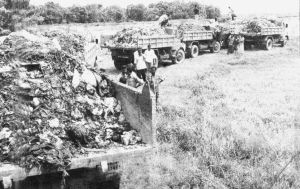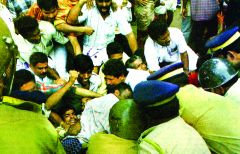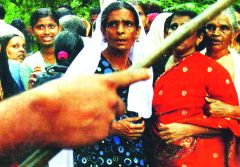On 6 July, the Junior Basic School at Brahmapuram in Vadavukode-Puthenkurissu Gram Panchayat, 17 kilometres away from Kerala's business capital Kochi, became a refugee camp. Groups of men squatted on the veranda and women and children huddled inside the hall. The heavy rains kept them confined to the relief camp for most of the time. At night they slept on the plastic mattresses spread out on the cement floor. The staff room of this lower primary school functioned as the kitchen and storeroom for the 'refugees'. Different organisations and generous individuals offered them rice and other provisions.

![]() Garbage trucks from Kochi city corporation rolling into Chellipadam. Pic: Mathrubhoomi.
Garbage trucks from Kochi city corporation rolling into Chellipadam. Pic: Mathrubhoomi.
The 200-odd women, children and men belonging to the Muslim, Christian and Hindu communities were refugees of a different kind. All the 53 families of the Chellipadam village in the vicinity of the site acquired by the Cochin Corporation for setting up a solid waste treatment plant at Brahmapuram, had to flee their homes unable to stand the stench of decaying garbage dumped by the Corporation in their midst. Perhaps it is for the first time in India that a whole village has abandoned their homes because of city waste. Most of the villagers, mainly agriculturists or cattle breeders, left their homes unprotected and their cattle unfettered.
Disaster struck them on 30 June when nearly 25 lorries all carrying stinking garbage from the city rolled in to the village with heavy police escort. The entire village had gathered on the road to prevent the trucks entering the area. "But even before we stopped a single truck, the police started beating us," says twenty-five-year-old Ramla Ali, who fainted on the spot. The women allege that the police didn't even spare their kids. "I was thoroughly beaten up as I could not run away," says C M Sadiq, a physically handicapped youth who suffered a leg fracture in the melee. Some of the men were arrested and taken away to the nearby police station.
The stench emanating from the garbage for hours made the locals sick. Some fainted; some others had severe headache and nausea. By evening 30 of them were hospitalised. Ignoring the peoples' protests, the Corporation continued dumping waste for five days on the site acquired for setting up the garbage treatment plant. It was then that the villagers left their homes and occupied the school one and a half kilometres away. The refugees remained there for about a week and returned to their homes only after a high-level conference convened by the Chief Minister V S Achutanadan on 10 July decided to stop the dumping of waste.
"But even before we stopped a single truck, the police started beating us," says twenty-five-year-old Ramla Ali, who fainted on the spot.

•
Burning biomass is not green
•
Whose garbage is it anyway?
The 37.33 acres of land acquired by the corporation in 1998 is a water-logged marshy land close to Kadambrayar, a major water body that joins with the Chitrappuzha and Manaykkathodu, the two rivers in the region. Four gram panchayats depend on Kadambrayar for their drinking water projects, and around 300 families eke out a living by catching fish from this water body. The villagers were not against the waste treatment plant. "The panchayat council had issued a No Objection Certificate for setting up the plant, not for open dumping of waste," says the gram panchayat president K K Johny, who belongs to the CPI(M).
An Independent Fact Finding Committee headed by environmentalist and advocate P K Ibrahim which studied the impact of waste dumping at Brahmapuram. The committee's report asserts that the corporation dumped unsegregated waste without taking any safeguards to prevent contamination of soil and water and the Kadamprayar. As a result, the main drinking water source of the villagers has been polluted as there has already been seepage into the water source, the report said. "What the corporation has done is a blatant human rights violation," says Professor C M Joy, a member of the committee.

![]() Police removing Brahmapuram protesters. Pic: Mathrubhoomi.
Police removing Brahmapuram protesters. Pic: Mathrubhoomi.
The State Human Rights Commission has initiated suo moto proceedings against the corporation. The Brahmapuram Action Council, formed by the residents, too is planning to register two different cases against the civic body. "The corporation has violated our right to live. Also, it has polluted our water and soil. We'll seek compensation for both," says Abdul Basheer, convenor of the Action Council.
It's the sheer indifference of the civic authorities towards the municipal waste management that led to the present crisis. Kochi, the fast-growing city, which has a floating population of about 1,00,000 people in addition to 7,00,000 residents, generates around 380 tonnes of waste a day, of which 150 tonnes is biodegradable and 100 tonnes is plastic. But the city never had effective solid waste treatment facilities. Landfill has been the method used for the last many years, though it's unsuitable for a city like Kochi lying at sea level. The corporation had to abandon its landfill at Cheranellore Gram Panchayat in 1998 after the village council passed a resolution against waste dumping following public agitation. It was then that the Corporation purchased land at Brahmapuram for setting up the waste treatment plant. But the plant never materialised.
Since 2002, the corporation had been dumping waste at the site close to the headquarters of the Southern Naval Command on Wellington Island. The Navy had repeatedly been taking up the issue of bird hits and flight safety with the corporation, but the latter totally ignored the issue. The Navy finally withdrew its permission in November 2006 when a Dornier aircraft of the Coast Guard suffered a bird hit in the vicinity of INS Garuda, the Naval Air Station.
With that, municipal waste disposal in Kochi came to a grinding halt. Rotten wastes piled up on roadsides. Canals were dumped with discards from mushrooming chicken shops and slaughterhouses. Hospitals in the city became clueless on how to get rid of their general waste. At many parts of the city, including Kakkanad, the district headquarters, heaps of plastic burnt continuously. The official and unofficial dumping grounds of the Cochin Corporation started over-flowing.
Caught in a spot, the corporation resorted to the easy way out by transporting municipal waste to remote villages in the neighbouring states. The civic authorities had not bothered to ask the contractor where the waste would be dumped or demand a No Objection Certificate (NOC) from the villages. On 6 December 2006, a convoy of 19 garbage trucks traversing through five districts in Kerala reached Moolahalli checkpost near Bandipur National Park in Karnataka. After a day's delay at the checkpost, the waste was finally dumped in a private land at Gundalpet, a small village 20 kms from the border. The next trip was to Tamilnadu. Much to the corporation's embarrassment, the garbage trucks were sent back by the Tamilnadu police and local residents. The Kochi waste had no takers and the garbage mountains piled up.
The urban waste disposal issue grew into a civil war like situation when on 5 January, a Division Bench of the Kerala High Court, considering a Public Interest Litigation filed by Dejo Kappan, a social activist, directed the civic authorities to dump waste at Brahmapuram. The court directed the corporation to seek police protection if required. Brahmapuram residents rose up in arms. "They have to kill us first," was the general mood.

![]() Women at Brahmapuram shocked by unexpected police action. Pic: Mathrubhoomi.
Women at Brahmapuram shocked by unexpected police action. Pic: Mathrubhoomi.
Since both the panchayat and the corporation are ruled by CPI(M)-led Left Democratic Front, the issue became political. The Corporation did not transport the city waste to Brahmapuram and instead 'managed' through clandestine disposals by dumping on already overflowing corporation sites inside the city. During nights, under the cover of darkness, solid waste was directly disposed off into backwaters. But once the monsoon broke, the city could not bear any more. Even the High Court had to be adjourned for a day because of the stench. The court threatened to dismiss the city council if its orders were not implemented forthwith. The corporation happily complied.
"We had no other options," says Mercy Williams, the city Mayor. "It's the High Court which directed the corporation to dump the waste at Brahmapuram. If we didn't carry out the court order, it would have been considered contempt of court."
But the corporation did not adhere to the conditions stipulated by the court, points out the Independent Fact Finding Committee. The court had directed that that a two-metre platform be raised and only scientific landfill done. The Corporation did not bother about it. The committee also points out that the corporation violated the Water (Prevention and Control of Pollution) Act (1974), the Environmental (Protection) Act(1986) and the Municipal Solid Waste (Management and Handling) Rules, 2000, which stipulates that collection, storage, segregation, transportation, processing and disposal of municipal solid wastes should be done within the territorial area of the municipality concerned. (Territorially, Brahmapuram is in the Vadavukode-Puthenkurissu Panchayat, as noted earlier.) How can the court permit violations of such statutory mandates, wonders the report.
Waste management experts point out that had the Corporation stuck to the rules and regulations regarding municipal waste, the disposal issues could have been solved to a greater extent. "The provisions No.324 to No.345 of the Kerala Municipalities Act deal with solid waste management alone," points out M M Abbaz, president of Trikkakara Waste Management Society, in Kakkanad.
Precarious waste managment scene statewide
According to a rough estimate, Kerala now generates 3,000 tonnes of solid waste every day. Only less than a half of this is even removed from the streets and only a tiny portion is processed or recycled. The rest is simply dumped in water bodies or used for unscientific land-filling causing serious health problems due to contamination of soil and water.
The Central Government's Municipal Solid Waste (Management and Handling ) Rules 2000 had set clear time frames for setting up of waste processing and disposal facilities, monitoring these facilities and improving the existing landfill sites. Identification of landfill sites for future use and developing site(s) should have been completed by December 2002.
"But none of the five city corporations and 53 municipalities in the state effectively implemented these legislations," says Abbaz. At the same time, he asserts, civic bodies alone cannot solve the problem, since the volume and nature of the wastes is fast changing. Kerala is a consumerist state having high density of population where the urban-rural difference is much less compared to other states. "No waste management programme will succeed without the full participation of those who generate waste," says M M Abbaz.
"It's estimated that on an average each individual in the big cities of Kerala produces 200-400 grams of solid waste a day, and in rural areas it's as low as 8 grams," points out environmentalist K Jayakumar of Thanal, a Thiruvananthapuram-based NGO engaged in effective waste management. "This could be easily disposed of at the source itself in a decentralised way. But the corporations generally go for centralised mode of waste gathering and disposal, which is complicated and much costlier." He points out that 70 per cent of Kerala's municipal solid waste is bio-degradable, and the civic authorities need to bother only about the remaining non-bio degradable discards. But, as the expert points out, the state is yet to formulate, let alone implement, a comprehensive waste management policy.
The high-level conference of the state government decided to entrust the disposal of waste to the District Collector A P M Mohammed Hanish till the completion of the waste treatment plant at Brahmapuram. The Collector suggested two places to the High Court, one on the periphery of the city and another yet again in a panchayat, Udayamperoor, a wet land, 20 kms away. But the court rejected both following people's resistance and also because they were found to be unsuitable. Right now the waste is disposed through a sanitary landfill at a reclaimed site owned by Gosree Island Development Authority (GIDA), inside the city for a few days on an 'experimental basis'. But trouble appears to be brewing there also.
Meanwhile, the Vadavukode-Puthenkurissu panchayat has decided not renew the NOC issued to the Cochin Corporation for the waste treatment plant. Which means the 'Cochin Waste Saga' is likely to see more stinking chapters unfold. (Quest Features & Footage)
